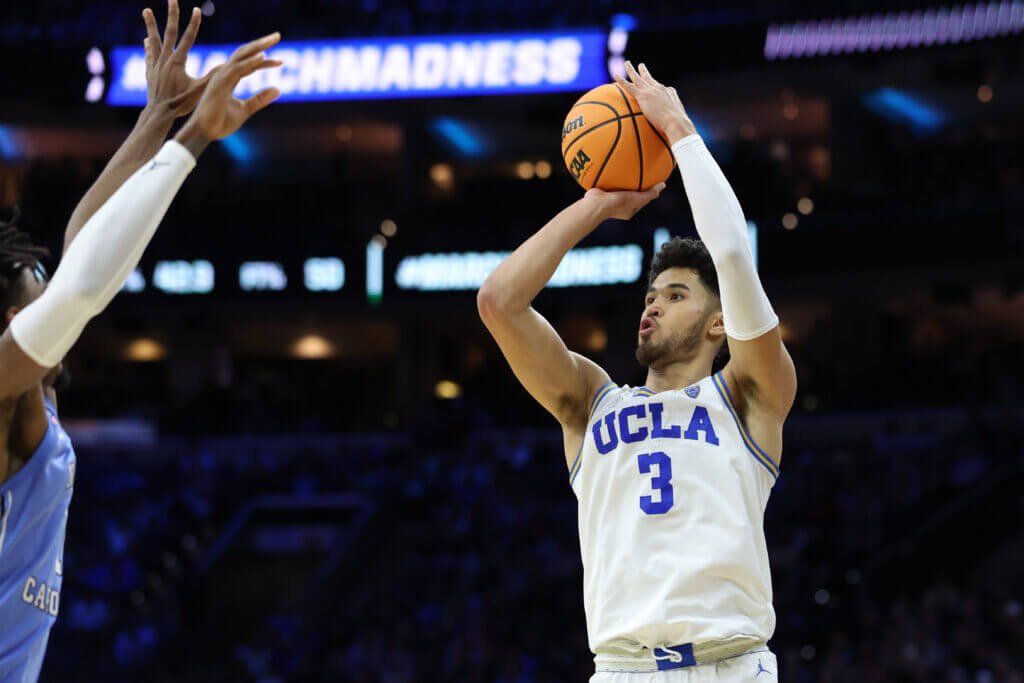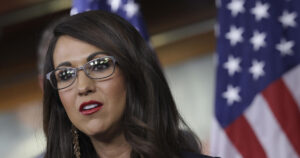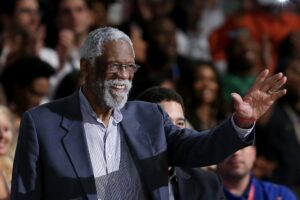During the 2021 NCAA Tournament, Johnny Juzang played himself into UCLA basketball lore. The team barely made the field of 68 as a member of the First Four, but thanks to Juzang, the Bruins came within a halfcourt bank shot of playing in the championship game. Juzang scored 23 points in an overtime win over Michigan State in the First Four, 27 in a first-round win over BYU, 28 (out of UCLA’s 51) in the regional final upset of Michigan, and 29 in the Final Four loss to Gonzaga — including the game-tying putback with 3.3 seconds left in overtime. Remarkably, Juzang did all of this on a badly sprained ankle that forced him to sleep with his leg propped vertically against a wall. He was unable to practice throughout the tournament.
The postseason scoring tear elevated Juzang’s draft stock, so he decided to test the NBA waters. He was invited to the league’s pre-draft combine and worked out for several teams, but his ankle was not fully healed, and there were too many questions about his strength and defensive abilities. He came back to UCLA in hopes of leading the Bruins back to the Final Four and propel himself into the first round.
Alas, neither of those things happened. Juzang still led the Bruins in scoring (15.6 points per game) and had some big performances, but the team lost in the Sweet 16, and Juzang’s scoring average and shooting percentages were down slightly from his sophomore season. When the Utah Jazz signed the undrafted free agent to a two-way contract Thursday night, it was probably a lesser result than Juzang would have had a year ago.
There is no denying Juzang’s talent. He is a lithe, graceful, intelligent 6-foot-7 shooting guard who has proven himself to be an explosive scorer in pressure situations. Yet, his junior season was marred by several injuries (including a hip contusion he sustained when he fell off a motor scooter he was riding around campus) as well as a COVID-19 infection that caused him to miss two games in late January. When Juzang was healthy and on his game, he was one of the best players in college basketball, but there were enough occasions when he was either unavailable or unproductive to raise questions in the mind of NBA scouts.
“I think he’s soft,” one NBA general manager told The Athletic. “He’s a catch-and-shoot guy right now who doesn’t play with a lot of toughness.” Adds another scout, “I like his size for the wing, and I like that he knows how to put the ball in the basket. But he’ll have to go to the G League to find his way, because it’s a different game in the NBA.”
Not surprisingly, UCLA coach Mick Cronin bristles at the suggestion that Juzang lacks toughness. “I would ask those scouts if they ever carried a team to the Final Four,” Cronin says. “Injuries threw him off all year, and he never got into a rhythm where he could have been a first-team All-American. But he still had a great season for us.”
The larger concern with Juzang is his long-range shooting. Though he had stretches where he was making 3-pointers as a high clip, he shot 35.2 percent from behind the line during his three years in college, and he made 36 percent last season. Not bad, but not enough for Juzang to have an impact in the NBA, especially considering the line is so much deeper. “His best-case scenario is he becomes Danny Green,” Cronin says. “He doesn’t have to remake his shot, but he’s got to shoot the ball with a little more arc to extend his range. He was deadly on his pull-ups, but he’s either going to be an elite, high-level shooter (in the NBA) or he’s not going to make it.”
Juzang has a mature mindset that leaves him primed for the challenge ahead. After reclassifying as a senior at Harvard-Westlake High School in Los Angeles, he committed to Kentucky, but he only averaged 2.9 points and 12.3 minutes as a freshman. That spring he transferred to UCLA. Though many cited his year in Lexington as evidence that Juzang initially chose the wrong college — or that he should not have reclassified — he never saw it that way. “It was hard as a competitor; you want to compete, but it was one of the most beneficial experiences I’ve ever had,” Juzang told The Athletic last October. “You need those learning experiences where you’re really facing a lot of adversity. If you’re not going to quit, then you’re going to figure out a way to make things work.”
Juzang is 21 now, and he brings a great deal of wisdom and experience to his next chapter. He has all the tools he needs to become a successful NBA player. The only question is how well he puts them to use.
(Photo: Bill Streicher / USA Today)



